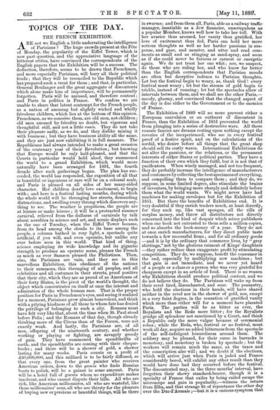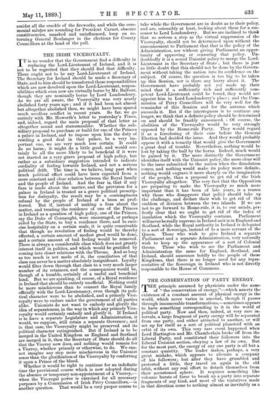TOPICS OF THE DAY.
THE FRENCH EXHIBITION.
ARE not we English a little underrating the intelligence of Parisians ? The huge crowds present at the Fete of Monday, the popularity of the Eiffel Tower, which is now past question, and the appreciative language of the bitterest critics, have convinced the correspondents of the English papers that the Exhibition will be a success. The deduction, therefore, seems to be drawn that Frenchmen, and more especially Parisians, will bury all their political feuds ; that they will be reconciled to the Republic which has prepared such a treat for them ; and that, in particular, General Boulanger and the great aggregate of discontents which alone make him of importance, will be permanently forgotten. Paris will be amused, and therefore content; and Paris in politics is France. We confess we are unable to share that latent contempt for the French people, as a nation of amusing but slightly wicked and wholly frivolous children, which lies at the bottom of this opinion. Frenchmen, as we conceive them, are old men, not children ; old men amused by frivolity no doubt, but vigorous and thoughtful still, and not a little maga. They do not take their pleasure sadly, as we do, and they dislike mixing it with business ; but they have business ability all the same, and they are just now exhibiting it in full measure. The Republicans had always intended to make a great occasion of the centenary year of their Revolution; but knowing that Europe would be only half-pleased, and that the Courts in particular would hold aloof, they summoned the world to a grand Exhibition, which would more naturally have been arranged for 1891, the fourth decade after such gatherings began. The plan has suc- ceeded, the world has responded, the exposition of all that is beautiful or ingenious or rare will be on a colossal scale, and Paris is pleased on all sides of her many-sided character. Her children dearly love excitement, to begin with ; and here is a festival lasting months, during which the whole world will be thronging her streets, demanding distractions, and swelling every throng which discovers any- thing to see. The weather is propitious, the people are at leisure or make leisure ; it will be a protracted summer carnival, relieved from the dullness of carnivals by talk about novelties in science and art, and scenic displays such as the one of Tuesday, when the Eiffel Tower became, from its head among the clouds to its base among the people, a column bathed in rosy light, a spectacle quite artificial, if you will, and even operatic, but unlike any ever before seen in this world. That kind of thing, science employing its wide knowledge and its gigantic strength to produce an operatic scene, pleases the French as much as ever Samson pleased the Philistines. Then, also, the Parisians are vain, and they see in this marvellous Exhibition, this obedience of the nations to their summons, this thronging of all peoples, and all celebrities and all costumes in their streets, proof positive that their city, which they are as proud of as Americans of their forty States, is the pivot of the world's thought, the object which concentrates on itself at once the interest and admiration of the whole human race. That is the proper position for Paris in Frenchmen's eyes, and seeing it realised for a moment, Parisians grow almost benevolent, and think with a pitying kindness of all those to whom fate has denied the privilege of belonging to such a city. Romans must have felt very like that, about the time when St. Paul stood before Felix ; and the Romans of that day, though already thinking more of the Circus than of the Forum, were not exactly weak. And. lastly, the Parisians are, of all men, offspring of the nineteenth century, and whether working or playing or fighting, are savagely .greedy of gain. They have summoned the spendthrifts of earth, and the spendthrifts are coming -with their cheque- books ; and there will be a shower of gold, a shower lasting for many weeks. Paris counts on a profit of £40,000,000, and this milliard is to be fairly diffused, so that every one, from the great painter who receives American orders, down to the gamin who finds Russian boots to polish, will be a gainer in some amount. Paris will be a hotel full of guests whom no expenditure makes insolvent, and who cannot dispute their bills. All who are rich, like American millionaires, all who are wasteful, like those millionaires' sons, all who are thirsty for the pleasure of buying new or precious or beautiful things, will bg there in swarms; and from them all, Paris, able as a railway traffic manager, insatiable as a Jew financier, unscrupulous as a popular Member, knows well how to take her toll. With her avarice thus aroused, her vanity thus gratified, her love of excitement thus fed, Paris can hold her more serious thoughts as well as her harder passions in sus- pense, and gaze, and saunter, and utter and read com- ments as small and as stinging as sand-spray, and seem. as if she could never be furious or earnest or energetic again. We do not trust her one whit ; nor, we suspect, do those who are ruling her, and who know far better than the English correspondents that Parisian moods are often but deceptive indexes to Parisian thoughts_ Let but the festival begin to weary, as, thank God ! every festival must weary ; let but the stream of gold begin to. trickle, instead of running ; let but the spectacles allow of intervals between them, and we shall see the other Paris,— moody, gloomy, and convinced that the changed aspect of the day is due either to the Government or to the enemies of France.
The Exhibition of 1889 will no more prevent either a. European convulsion or an outburst of discontent in France, than the Exhibition of 1851 prevented the world from plunging into a series of destructive wars. All those roseate fancies are dreams resting upon nothing except the reveries of the inexperienced, who see in every festival proof of a festive spirit, and on the calculations of the sordid, who desire before all things that the great shop should sell its costly wares. International Exhibitions do not alter the passions, or the relations, or the permanent interests of either States or political parties. They have a function of their own which they fulfil, but it is not that of pacificators. When wisely managed, and not too frequent, they do probably increase the intelligence of manufacturers and customers by collecting the best specimens of everything, and compelling them to compare them ; and they do, we suppose, in some limited degree, also stimulate the brains of inventors, by bringing more sharply and definitely before them what the world wants. We might never have had machines for making envelopes but for the Exhibition of 1851. But there the benefits of Exhibitions end. It is very doubtful if they enrich traders much, at least directly,. for they suck up, like vast sponges, all the rills of surplus money, and throw all distributors not directly concerned into the kind of despair which seizes publishers when one book not entrusted to them sells a million copies, and so absorbs the book-money of a year. They do not at once enrich manufacturers, for they direct public taste towards a few successful firms • and for all ordinary goods —and it is by the ordinary that commerce lives, by "grey shirtings," not by the glorious raiment of Kings' daughters —they rather reduce than exaggerate profit by stimulating competition. They do, we suppose, benefit the consumer in the end, especially by multiplying new machines ; but that gain is . not immediate, and, we never yet heard of a people or a class or a person who was very grateful for cheapness except in an article of food. There is no reason why Exhibitions should produce political content, and we do not believe they do. The Parisians will wake up from their revel tired, disenchanted, and sour. The peasantry, who hold the elections in their hands, will have shared neither in the revel nor in the shower of gold, nor, except in a very faint degree, in the sensation of gratified vanity which more than either will for a moment have placated Paris. The parties will be as bitter as ever, the Royalists and. the Reds more bitter ; for the Royalists grudge all splendour not sanctioned by a Court, and think a. Republic only the more vulgar because of ceremonial robes ; while the Reds, who, festival or no festival, must work all day, acquire an added bitterness from the spectacle of the self-indulgent leisureliness around them. The soldiery may be pleased, for their curse in barracks is monotony, and monotony is broken by spectacle ; but the workers will remain much the same, as the taxes and the conscription also will ; and we doubt if the elections, which will arrive just when Paris is jaded and France considerably bored, will exhibit any other result than they would have done had they occurred before the festival- The discontented may, in the three months' interval, have forgotten their showy standard-bearer, though it is a specialty of France that exiles by being exiled escape the microscope and gain in popularity,—witness the return from Elba, and that strange fit of repentance the other day ever the Due d'Aumale ;—but it is a curious symptom that amidst all the crackle of the fireworks, and while the cere- monial salutes are sounding for President Carnot, obscure constituencies, unasked and uninfluenced, keep on re- turning General Boulanger in the elections for County Councillors at the head of the poll.







































 Previous page
Previous page